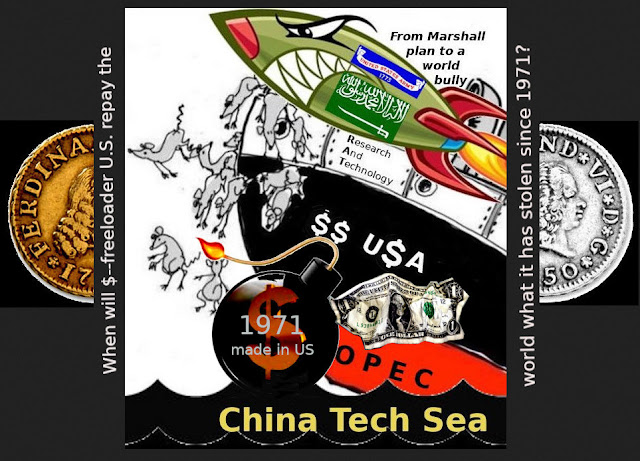Peter Klevius: EU is in reality like a faulty* twin with China and has almost nothing (except dangerous militarism) in common with US anymore - yet EU politicians act against the best for the people.
* EU Commision doesn't even come close to the Chinese Communist Party when it comes to support from the people. And no, it's not China but EU that has an increased need for propaganda, censorship and misinformation. In fact, modern technology inevitably leads to a system similar of China - with the exception that China's is smoother and produces much less tension and criminality. It's sickness to try to connect today's China with the horrors of post WW2 that was a consequence of Western and Japanese militaristic meddling.
EU (research): Europe’s footprint in digital technology is much weaker than that of the U.S. On the one hand, this requires Europe to seek cooperation, primarily with democracies. On the other hand, Europeans find it even more difficult to decouple from Chinese technology supply chains.
Peter Klevius: Does "primarily with democracies" mean that EU is OK with islamist dictator states like Saudi Arabia and othe Gulf states, but for some reason (US) can't seek cooperation with China! And why should EU decouple from Chinese technology? Because US says so?!
EU: China is very clear about what it aims to achieve with its digital tech stronghold. Digital technology is supposed to strengthen the party-state from generating prosperity and social stability to perfecting digital authoritarianism and projecting Chinese power. Europe and the United States lack such a clear vision. This should be a valuable starting point to collectively think about a broad strategic vision alongside more narrow policies targeting specific concerns and vulnerabilities.+
Peter Klevius: Is it bad to "be clear"?! And how does EU's and US' "digital authoritarianism" differ from the Chinese one? The first amendment has since long been made meaningless in the US and doesn't even exist in EU. And why is China "very clear about what it aims to achieve with its digital tech stronghold. Digital technology is supposed to strengthen the party-state from generating prosperity and social stability to perfecting digital authoritarianism and projecting Chinese power" any different from EU and US? And the deliberately bad sounding "to strengthen the party-state" should be synonymous with the commision party state of EU - which has less support from EU people though.
EU: While China’s digital capabilities are rapidly rising, the country is not dominant yet. Unquestionably, China has developed into an innovation powerhouse and is central to global supply chains. However, China’s remarkable achievements should not overshadow that – just like any other country – China does not dominate the whole front and continues to depend on foreign technologies. The country aims to tackle this by focusing on strategic and emerging technological niches. China normally does not tackle existing Western strongholds but rather aims to outcompete U.S. and European rivals in fields that are just emerging.
Peter Klevius: The litho machine that China wanted to buy from Holland was denied by US who themselves can't produce one! The inevitable truth however is that China's high tech development curve is steeper than that of the West. So no matter where China is today - tomorrow it's far ahead. And sooner or later ignorant Westerners start realizing it despite the Goebbelian propaganda we are fed with.
EU: We find that the four-dimensional prism we used to analyze challenges arising from China’s growing digital footprint was extremely useful. The four dimensions include an economic, a political, a security, and an ideational angle. Each of these dimensions carry their own challenges from an uneven playing field undermining European competitiveness to political challenges arising from technological lock-in dependencies to network security vulnerabilities and diverging values inscribed in European and Chinese technologies and regulations.
Peter Klevius: Why are "challenges arising from China but not from US?! And EU's "diverging value" is nothing else than that EU supports Human Rights violating islamism and accuses China of Human Rights violations when China doesn't do the same!
EU: Europe is relatively well-positioned vis-à-vis China when it comes to innovation and research, but too often do we fail in turning innovation into invention. Another weakness is fabrication. We should draw conclusions for proactive policymaking as well as for defensive measures protecting European innovation from this finding.
Peter Klevius: "Well-positioned vis-à-vis China when it comes to innovation and research". Really! "Defensive measures protecting European innovation" was what created EU in the first place, when Japanese high tech outcompeted the European one. To an extent that when Peter Klevisu bought a fully analogue-digital Sony video camera 1997, it was restricted by EU regulations so that one shouldn't be able to utilize built in A/D converter. Why? Because EU didn't have any such tech available. Already in the 1980s European companies started buying high tech products from Japan and the placing their own brand on them before selling to consumers.
EU: European dependence on Chinese digital technologies varies across sectors. The global semiconductors supply chain is collaborative across countries and regions. The U.S. dominates chip design, and Taiwan fabrication. Testing and packaging are more diversified with an increasing role for China. The EU is weak with the exception of photolithography systems, machinery required for the fabrication of chips. However, China is also not strongly positioned and aims to catch up. Only if Taiwan was controlled by Beijing would the balance tip against the EU and all other Western countries.
Peter Klevius: It's only a question of time before the Taiwanese realize they are better of together with China and with a similar system as Hong Kong. When the mainland grass gets even greener, and the uglines of US even more apparent, then the politics in Taiwan will change anyway. The Taiwanese are Chinese after all.
EU: Europe continues to be a global standardization power. It punches far above its economic weight in international technical standardization organizations. The U.S., in contrast, rather spreads its technical standards by means of market power and strong industry consortia.
Peter Klevius: Compared to stupid US which hasn't even learnt the metric system as yet. However, China is bigger, faster and more developed than Europe - while having similar edge in standardization etc.
EU: China is rapidly catching up and has understood the strategic value of technical standardization. It spreads its domestic specifications in international standardization organizations but also as part of infrastructure projects of the Belt and Road Initiative. Most worrisome is not only the ongoing power shift but that China is also questioning the privately driven approaches of the EU and the U.S. to standard-setting. In China, technical standardization is a domain steered by the party-state and so are China’s international activities.
Peter Klevius: Why is EU but not China allowed to be a global standardization power?!
EU: The U.S. and the EU have quite different approaches to technical standardization. This makes cooperation difficult. However, if procedural issues can be put aside, both transatlantic partners could focus on countering the uneven playing field with China, strengthen the role of fundamental values, primarily human rights, in tech standardization, and strive to prevent the bifurcation of technical standards in strategic sectors. The latter is essential to prevent developing countries getting even more locked into Chinese tech.
Peter Klevius: Nothing can be "put aside" with US because US is trapped in its $-fraud - and wants to drag EU into it as well!
EU: In digital tech both common interests but also significant divergences in perspective shape the transatlantic relations. Both sides should find it easy, for example, to agree on the role of human rights protection.
Peter Klevius: As long as US and EU support anti-Human Rights islamism it's a blatant lie to talk abou Human Rights in China - especially when there's no difference between Western and Chinese deradicalization programs! Except that e.g. in UK the Prevent program has been declared "islamophobic" which has led to many islamist terrorist attacks against Brits that otherwise may have been preventable.
EU: Second, Europe’s footprint in digital technology is much weaker than that of the U.S. On the one hand, this requires Europe to seek cooperation, primarily with democracies. On the other hand, Europeans find it even more difficult to decouple from Chinese technology supply chains. The challenges both sides face are not the same.
Peter Klevius: China’s share of global R&D rose nearly 488 percent from 4.9 percent in 2000 to 23.9 percent in 2019. If you see a vehicle fast speeding in on you, you expect to see it passing you shortly, not stopping by your side, right. From cloning to cancer research, from sea to space exploration, China is using nanoscience and nanotechnology innovation to drive some of the world’s biggest breakthroughs. Add to this a relatively homogenous population and a homogenous regulatory system, and you'll see the emptiness and pure ignorance or alternatively, deliberaate misleading that EU politicians are guilty of.
The US National Science Board’s warned in a recent report – State of US Science and Engineering 2022 – that China is pulling ahead of the United States when it comes to key indicators of science and engineering prowess.
The US is falling behind China in important areas such as growth in research-and-development investment, the manufacturing of critical emerging technologies and patents for innovative systems, National Defense reported.
China is also leading the US in knowledge- and technology-intensive, (KTI), industry manufacturing.
Scott Moore: China is fast becoming a biotechnology powerhouse and a perceived threat to the longstanding dominance of the United States in the sector. In Washington, these developments have been greeted in much the same way as China’s growing prowess in artificial intelligence and other emerging technologies: with panic and punitive measures. Last May, Florida Republican Senator Marco Rubio introduced the Genomics Data Security Act, which would, among other actions, ban the National Institutes of Health from funding China-affiliated entities. In September, Arkansas Republican Senator Tom Cotton and Wisconsin Representative Mike Gallagher called for “blacklisting” Chinese biotechnology companies over concerns they may be attempting to gather biomedical information on U.S. citizens for nefarious purposes. Just a few months later, the U.S. government sanctioned 12 Chinese life sciences research institutes and 22 private firms on security grounds. There is a big problem, however, with these largely reactive, security-focused responses. Biotechnology is an intrinsically transnational and rapidly evolving sector that holds just as much promise for mutually beneficial collaboration and cooperation as for competition and contention. These distinctive characteristics of biotechnology mean that Washington’s security-driven approach to China and biotechnology risks harming U.S. competitiveness in the sector instead of enhancing it, while also limiting America’s ability to share in the development of mutually-beneficial technologies and work with Beijing to address the shared challenges posed by rapid developments in fields like gene editing. U.S. policy and strategy on China and biotechnology must strike a better balance between addressing legitimate concerns while maintaining the openness and innovation that underpin America’s competitive advantage in emerging technology.
Peter Klevius: It's no longer a question about "security" at all but instead the realization that when US shortcomings become more obvious then the trust in the dollar hegemony is at risk. US is in an extremely peculiar position thanks to the now accelerating $-printing on the behalf of the rest of the world since 1971 when US started its $-fraud. $-freeloader US pulls the gun instead of trying to correct its ugly behavior.




